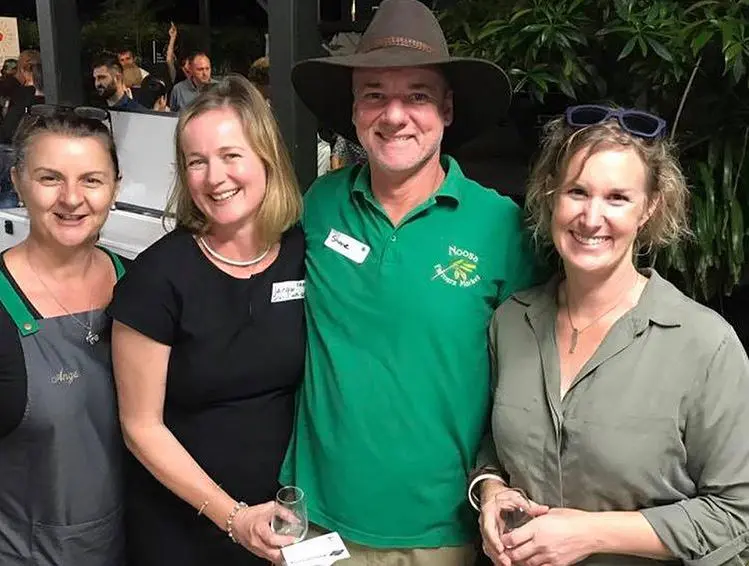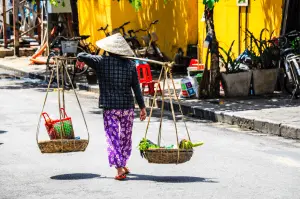It has been said that it’s not what you know, but who you know – and in the world of export, it is true that it is impossible for any single person to know it all. We spoke with three Australian businesses about creating supportive networks for export success. From cold calling to collective collaborations; packaging fiascoes to trade shows; and industry associations to instant messaging international buyers – this adage held true. It’s not always what you know, but what your tribe knows, that goes.
Craig Smith | Gourmet Garden | Head of International Trade, Asia
“For us, building a solid network was really important. The Sunshine Coast has developed a unique collaborative network known as the Food and Agribusiness Network, which brings people from all different parts of the food and agribusiness community together to talk about the various issues they’re having,” said Craig Smith, Gourmet Garden’s Head of International Trade with Asia. “In this way we share experiences, successes, and understand together about how different markets, opportunities, and retailers work. So it really is a great opportunity. Working with the Sunshine Coast Council as part of this, it all comes together nicely as a portfolio. It’s a great mix of different businesses from different walks of life coming together and acting as one – not necessarily having one voice, but having a lot of different voices that all say the same thing. It’s very important. It really works, and it’s a movement that is going to continue to build and grow in momentum.
“As a business connecting into various markets, the most important thing was to understand what the market was really like, either through the experiences we ourselves had, or connecting with other people who have actually had experiences in those markets. We hired consultants who actually had the specific detail, the experience and expertise in a particular market; whether that be China, the US or the UK. We made sure we found people that actually knew the market and understood these markets.
“But we went one step further, in working with Local Governments and the State Government. Trade and Investment Queensland is excellent in most markets, but they can only go so far; Austrade are excellent in a lot of markets, but they can only go so far. I think it really comes down to connecting with all of them, and working with them all so that each stakeholder can present its own expertise. If you can capitalize on the expertise these people have and what they can offer you and your business, it will give you that extra leap forward in understanding the core wants and needs of your business.
“Going into a marketplace, you have aspirations of what it’s going to be like, about how large the business is going to grow. You really need to take the steps to understand how long it might take by hiring the right people with expertise in those marketplaces. I think you need to have a team of people around you. It’s almost impossible to do it on your own. No one has that experience. No one has that knowledge of individual markets. Reach out. Pay a little bit more money. It’s safer to pay a little bit of money and get the right expertise to give you the right information and move forward on that. You’re not going to get it right all the time, but when you do get it right: success.”
Samea Maakrun | Sasy n Savy | Managing Director
“We mainly connect with buyers at expos,” said Samea Maakrun, Managing Director of Sasy n Savy. “Nineteen years ago I made my first trip to Asia, because I realized there weren’t many Australian companies exporting overseas. When I came home three years later and had brands approaching me to do private label for them, I selected 3-4 companies per year, and focused on attending CosmoProf, a major beauty expo held all around the world – they’re in Hong Kong, Bologna (in Italy), and also in Las Vegas.
“Over the years, I have exhibited at these expos, and allowed my customers to exhibit with me. We always do a huge press release to all the media and buyers connected with each show. This has allowed other Australian companies to get into the market, and created a bit of a tribe too.
“Expos are quite successful. When we do expos now, there is demand from international companies to make the meetings for us – the hard work has paid off. The first couple of years, there was a lot of investment, with little return. But after the fifth and sixth year, we started to see the return.
“We also find through these expos that you can understand a lot more about countries than you’d think. Recently, we found out about trade embargoes in Qatar making it difficult to import brands. Most of the brands are coming from Dubai and Saudi Arabia. A lot of new companies are out there though, and if you need a market, you can approach the Qatar distributors because they’re desperate for product at the moment. So much so that a lot of the big distributors are employing people from all around the world to start bringing in brands from every corner of the globe.
“On top of expos, we’ve also found cold calling works well. Everyone says, ‘Yes, China is a big market,’ but it’s a very risky market. There’s a lot of fraud. There’s a lot of corruption. There’s a lot of loss-of-money that can be had as well. We’ve gone through all that over the last ten years, registering our products in the China market.
“There are so many other countries, if you do your research. Russia, Mexico… Find out if there’s demand for your products in each of these markets. Keep an eye out for the trade embargoes, what’s happening in each market, and attend expos.
“In regard to stakeholders: everyone’s a stakeholder within our company. From the suppliers who make sure the raw material is always fresh, to developing connections with Federal, State and Local Government. We also have strong relationships with our lawyers and accountants as well, not only here in Australia, but also overseas, to protect our trademarks all around the world. Before we entered into any country, we had to get our trademark covered in black and white, in English, and also in the spoken language of each country. We were copied in so many countries in such a short period of time.
“Regulations are also changing all around the world. For skincare, there are a lot of ingredients you can’t use in the various markets. You’ve really got to understand your customers. They’re also an important stakeholder, because the requirements in each country for skincare vary. In the Middle East, they prefer aromas that are very strong, whereas in Asia, they’re after floral aromas. These customers are also very important, and we consider them our stakeholders. They feed through information.
“We’ve experienced a lot of lessons in regard to the colouring of our packaging in certain countries. Even when we had invested a lot of money on packaging which we thought would go well in the China market; the Chinese all said ‘Yes’ in the meetings that we went to, but the orders never came in. It took us a year and a half, and no one told us this – not even our Chinese customers. Eventually, one of our staff members who was Taiwanese picked it up, and said, ‘I think the colour red that you’ve used means “stable-and-half-unstable” in the China market.’ The minute we changed it to a solid red, the orders came in.
“There are a lot of lessons that you learn along the way. Some countries don’t like plastic packaging. We’ve got a shipment trying to get to Albania this week, and we found out that it’s urgent. However, we found out that once we ship it into Albania, we can’t get it properly into the country because they can’t be more than 90 kg, because of the trade sanctions there. We do shipments into Colombia, but have found that we can’t ship our labels there because the product gets stolen off the wall. Where does it end? Every day is a different lesson, and that’s why everyone is a stakeholder in our business – from the logistics, to the suppliers, to everyone.”
Jacqueline Donoghue | Lively Linseed Products | CEO
“There are a lot of startup costs when you go straight from the raw material in the paddock to a saleable product which is 99.9% pure,” said Jacqueline Donoghue, CEO of Lively Linseed Products. “There are a lot of startup costs involved. I didn’t have a lot of money, so I used what I did have to partner with Austrade and NSW Trade and Investment. I attended an expo on an Australian stand; it was done very well. There is a cost involved, but far less than if I had set up my own stand at these export trade shows. Because Australia is the flavor of the month at the moment, we got lots and lots of buyers. I also use the TradeStart Advisor for our region, Rob Harrison, as a sounding board for all things export. He is very much a part of our export team.
“I use daigos here in Australia. They’re a wonderful source to use to communicate about products to customers. They educate their customers about your product, so that’s been a great channel for us.
“We also communicate with our customers on social media. We do it with WeChat. Chinese customers don’t get Facebook, YouTube, or any of that, so we do it all on WeChat. That’s how we get direct feedback. They post on their own WeChat channels about how they’re using our product, and it gives us insight into how we can change and adapt and be agile in that market.
“One of the things we learned from this feedback was about a product that sells here in Australia in a 400g pouch. We resized it down to something that they preferred – a 250g pouch, and sales have gone up. We also changed the packaging a little, to make it more obvious that it was from Australia. These were key feedback gained from our international buyers.
“You need to constantly chat with your buyers, ask what other products are selling in your category, which countries they are from, about their selling points compared with yours. It’s a two-way exchange. You have to put an effort into asking your buyers and then respond to that feedback, to get the best result; both for the business and for them, because they sell more that way, too.”
One of the quickest ways to create a network is to join one – and sometimes it’s as simple as making one single connection. Finding one person with key relationships that they’re willing to share with you can save you a lot of heartache – and cold calling! To find out more about how to select the right markets, connect with pre-qualified buyers and grow your export strategies, reach out. We’d be glad to connect, and to be a valuable part of your tribe.
Picture credit: Food and Agribusiness Network (FAN), Instagram. A meeting of the minds; Emma Greenhatch of FAN and other suppliers and stakeholders gather together at Sunshine Coast Foodie’s event, Meet the Maker.




